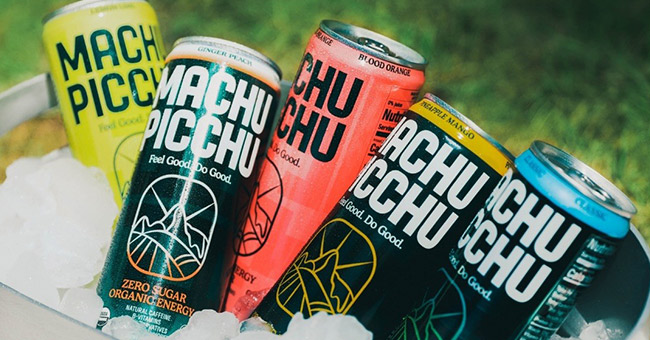
When it comes to competing in the $17.8 billion energy drink category, Machu Picchu knows it has a big mountain to climb. But with better-for-you positioning, experienced leadership and a new line of yerba mate drinks debuting next month, the California-based startup says it’s ready for the challenge.
Founded in 2021 by Brazilian beverage entrepreneur Bernardo Paiva, former chief sales officer for Anheuser-Busch InBev and later CEO of its Ambev division, Machu Picchu launched last May with a four-SKU line of full and zero-sugar organic energy drinks (120 mg of caffeine) and a two-SKU line of organic energy seltzers (40 mg caffeine), each packaged in 12 oz. cans. The drinks retail for $2.99 each.
Under the leadership of CEO Daniel Scharff, also the founder of Startup CPG, the brand has expanded distribution in retailers nationwide, including Central Market, Erewhon, Fresh Thyme, BevMo!, Town & Country, Citarella Gourmet Market, Gristedes, and Lassens, as well as delivery platforms GoPuff and Good Eggs. As well, Scharff said the brand is preparing for upcoming rollouts into Winn Dixie, Meijer, Fred Meyer and NCG stores this year. The company currently has five full time employees, Scharff said, and is looking to expand with the top priority being to hire a sales manager for the West Coast.
“Whether they’re energy drinkers or non-energy drinkers, the taste of the liquid is so appealing to people that if we can get out into stores and just make sure we get cans in hands and people trying it, we have excellent conversion,” Scharff said.
Machu Picchu’s launch has come amid a surge in the better-for-you energy drink space, which has helped drive +10.7% overall category growth in the 52-week period ending January 28, according to NielsenIQ. While many of the fastest growing brands in the category have benefitted from low- or zero-calorie formulations and functional benefits, Scharff noted many of those products still often feature artificial ingredients alongside natural ones..
“We just saw a big opportunity to try to introduce a craft approach to this category.”
Organic and natural energy drinks have historically been slow to gain major traction in the market, but it’s not for lack of competition or innovation. Brands like PepsiCo’s Rockstar, Vita Coco’s Runa and Anheuser-Busch’s Hiball have all provided organic energy options, while Canadian brand GURU has been working over the past several years to build out its business in the U.S. Other startups such as Marquis and NOOMA have similarly sought to provide healthier energy drinks.
But despite past struggles within energy, consumer demand for better-for-you and clean label food and beverage has not slowed down, and Scharff said Machu Picchu intends to win on flavor and its “Feel Good, Do Good” messaging.

As well, the brand is looking to establish itself in another growing beverage category: yerba mate. The caffeinated herbal infusion has been similarly positioned in the U.S. as an energy drink alternative and, led by independent brand Guayaki, Scharff said the category grew double digits over the past year. With brands like Texas-based CLEAN Cause helping to raise consumer awareness, Scharff believes Machu Picchu is well positioned to ride the rising tide.
“Where the growth [in yerba mate] is coming from now, is it’s erupting into the mainstream,” he said. “It’s getting into much more conventional retailers and convenience stores. People in general are just looking for healthier energy options – They want the energy, but they want to feel good about it.”
Developed in partnership with brand ambassador and pro surfer John John Florence, Machu Picchu is launching two flavors of zero sugar yerba mates at Natural Products Expo West 2023 next month. Available in Alpine Mint and Ocean Citrus varieties, the 12 oz. canned drinks contain 120 mg of caffeine.
Scharff said the brand has secured Central Market, Fred Meyer, Banzai Bowls and Mother’s Market accounts to serve as “anchors” for the line rollout and it will continue to grow the yerba mate business nationally from there.
Looking ahead, Machu Picchu aims to tie itself to outdoors experiences and active lifestyles, and has planned marketing activations around surfing and mountain climbing events. The partnership with Florence, Scharff said, will be an important part of the brand’s marketing strategy this year, while traditional in-store field marketing will be another key focus.
The brand will also promote its charitable mission to support underprivileged children in both the U.S. and South America. According to Paiva, part of his inspiration to create Machu Picchu came from his passion for kids’ outdoors programs and education initiatives.
Machu Picchu has now aligned with education and community building organizations like UNESCO, Favela Radical in Brazil and Alto Peru, of which the latter two promote learning and outdoor activity programs for children in need. The company has additionally established a program to teach “socially conscious entrepreneurship” to students in underserved communities, including its Bev-Launch Entrepreneurship Simulator program which launched last year in Miami-Dade County public schools in Florida and is now developing a national curriculum with a planned expansion to 35 states.
“It’s possible to be an entrepreneur with a mindset that’s more humanizing,” Paiva said.